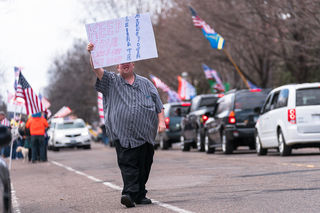Environment
True Freedom and the Quarantine Protests
Many of the protestors misunderstand the true nature of freedom.
Posted April 21, 2020 Reviewed by Lybi Ma

Recently, people in several states have taken to the streets to protest government restrictions aimed at limiting the spread of the coronavirus. Many of these protestors are urging their states to allow them to go back to work.
Their feelings are understandable. They are worried about their futures. They don't like staying at home. Others, however, are not just concerned about going back to work, but also about getting their hair colored and cut. Others are concerned that their Second Amendment rights are under attack. Still, others continue to maintain that this is all a hoax. Many of them, I propose, share one misguided belief. They chant "freedom is essential," but they do not understand the nature of genuine freedom.
On the way many in America view freedom, consider the following from Stephen Evans:
All of us value freedom. I think American society is positively obsessed with the idea, and all too often, we equate freedom as freedom from any constraints whatsoever. So freedom is just the power to do what I want, to choose whatever I want. My freedom is infringed when the government tells me I cannot cover my front yard with litter and junk cars that offend my neighbors. Or when the government tells me I must pay taxes, and therefore cannot spend every dime of my money exactly as I want to do. When freedom is understood in this way, as freedom from constraint, freedom and accountability become a zero-sum game. Every time I’m held accountable by someone, my freedom is diminished, and my own self and happiness are constricted.
Many think their freedom is infringed when they are told to engage in social distancing to flatten the curve. The point of social distancing is not merely to avoid offending our neighbors, however. The point of social distancing is to protect their health, even their very lives.
Those who choose to go to church, gather in large groups, or protest the current restrictions may have several misguided beliefs. They may believe that freedom means being free from all constraints. This is false. They may believe that freedom should not also include accountability. This is also false. They may believe that freedom means choosing what they deeply want to do, regardless of the impact on others. This is false, as well.
Freedom, properly understood, includes the freedom to do what is right. Our freedom to do what is right is grounded in the basic dignity we possess as human beings. But that same dignity entails that we have responsibilities to other people, that we are held accountable for our choices. As Evans puts it, freedom is "a gift that’s meant to be used; it has value only when used well."
There will come a time when social distancing, especially as we are currently doing it, should end. But those who want it to end now are making several mistakes. Their view of freedom is mistaken. Freedom is not, strictly speaking, absolute. It is limited by serious harm to others. Freedom must include responsibility and accountability.
The kind of freedom worth valuing and practicing is the kind that recognizes other values. In fact, freedom only makes sense within a larger scheme of values. We should use our freedom well, as a means of caring for others. Such freedom always calls for sacrifice. The form that sacrifice takes is new for all of us. But that doesn't negate the fact that the truly free person will make such a sacrifice for the good of others.


